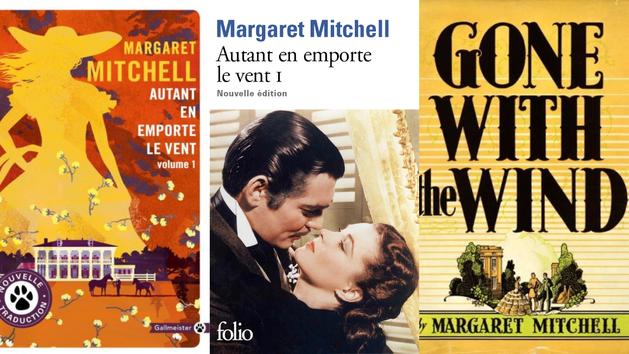The novelist Margaret Mitchell's masterpiece, Gone with the Wind, published in French in 1939, the same year as the film's release at the 10 Oscars, appears on Thursday for the first time in a new translation. Published in two volumes (720 pages each, 13 euros), in pocket format, by Gallmeister editions, this new version required a year of work and research on the part of the translator Josette Chicheportiche who had the difficult task of revisiting a work, superb and flamboyant, but also terribly dated and scandalous in its way of describing racial relations in the slave South.
Timeless fresco on love and war, Gone with the Wind tells the story of Scarlett O'Hara, daughter of wealthy southern landlords, who will see her world collapse with the Civil War. Refugee in Atlanta after a heartache, she will meet the adventurer Rhett Butler, with whom she will share a tragic passion ...
Read also: Accused of racism, Gone with the wind in the turmoil in the United States
In the French version edited since 1939 by Gallimard, Margaret Mitchell's " historic " translator , Pierre-François Caillé (1907-1979) had chosen to make black people speak of the plantation in a caricatural way, replacing in particular the sounds " r " by a apostrophe. " Is this your child's maid?" Ma'ame Sca'lett, she is you young op to take care of the son of missie Cha'les! ", Says a black character in the 1939 version. In the pen of Josette Chicheportiche it becomes:" She is your child's nurse? Ma'ame Scarlett is too young to take care of Mr. Charles' only baby! " Although undeniably a product of its time, just like the novel ", the translation of Pierre-François Caillé " continues to delight with its charm and impress with its thoroughness ", maintains Gallimard who held the exclusive rights to the book until January 1, before the novel falls into the public domain.
In addition to the release of the new version of the novel at Gallmeister, Gallimard is also publishing on Thursday, in its pocket collection Folio, a new two-volume edition of the only book by Margaret Mitchell. Readers will find the translation of Pierre-François Caillé there but will also discover part of the unpublished correspondence between the French translator and the American writer who died accidentally in 1949.
Read also: Gone with the Wind : Scarlett's dress sold for $ 137,000
In one of the letters, Pierre-François Caillé explains to the novelist her choice of translator. “ You will notice the omission of the consonant characteristic of this language which we often call“ little negro ”. I think there was no other way to do it, "he said in a letter dated December 1937." I think your translation is the only foreign translation of my book in which the characters negroes speak in dialect ”, congratulates the novelist in return.
Compared to the French edition of 1939 (the novel was published in the United States in 1936), Josette Chicheportiche tried to be more faithful to the original text. We can thus compare the first and the last sentence of the novel. In the 1939 French version, the book begins with " Scarlett O'Hara was not of classical beauty ". The 2020 version is content with " Scarlett O'Hara was not beautiful ". The original sentence is " Scarlett O'Hara was not beautiful ". The last sentence in the Gallimard edition is " Tomorrow, I will look for a way to bring Rhett back." In short, to one day near ... "At Gallmeister the last sentence is:" Tomorrow, I will think of a way to bring him back. After all, tomorrow is another day . ” In English, the book concludes with the words: " Tomorrow, I'll think of some way to get him back." After all, tomorrow is another day ”.
Read also: The origins of Gone with the Wind
Between the two versions, only one thing has not changed: the title! The French title of the book ( Gone with the Wind in OV) was not easy to find. The masterpiece with more than 30 million copies sold in the world, including 2 million in French, could have been entitled Carried by the wind, The wind has passed, When the wind is blowing or After the storm, reveal Gallimard's archives. It was the editor Jean Paulhan, director of the NRF, who decided for Autant en emporte le vent.

